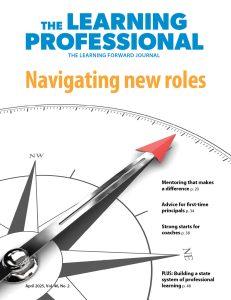Teachers, to get advice on having hard conversations with your veteran administrator, read this previous blog post.
Principals often tell me their entire workday is filled with fires to extinguish, a few challenging parent interactions, and a load of hard conversations. Some feel those communications are routine and don’t find them too difficult: “I don’t have any hard conversations in my inbox; I handle them all.” Others take them home, repeat them on a loop, and make themselves sick over what they should have said or must say tomorrow.
Whether you more often find yourself in the former group or the latter, every school leader can benefit from a few new ideas to simplify hard conversations and handle them effectively. Here are three pieces of general advice for approaching a difficult conversation with someone you supervise:
- Clarity before accountability. It is key that both parties are aware of the concern as something that isn’t personal, but strictly professional. Is there a set of standards around which the conversation is based? Do both of you know what they are, or is there a possibility the teacher will feel the concern is “coming out of nowhere?” We often believe things are understood to be expectations when, in fact, all parties may not be on the same page. Making sure everyone has the same understanding of expectations is a good way to start so there has been clarity before accountability.
- Watch your language. We oftentimes begin a hard conversation with adjectives and adverbs that are unnecessary and inflame the situation. We speak of people “willfully” or “deliberately” doing things and speak to motivation instead of the behavior. It causes things to get ugly when they, instead, should be spoken of in neutral terms. Telling someone they are a “hot mess” is most likely going to exacerbate a situation, and that descriptor is not in the standards.
- What do you want to see instead? Be ready for a question that asks you to answer, “What do you want me to do about it?” If you have some ideas at the ready, you will be able to respond neutrally, without emotion or surprise, and your ideas can be thoughtfully taken into consideration or implemented more easily. Knowing what you want is better than “Well, we hired you so you go figure it out.”
Beyond the general supervisor-employee dynamic, another important element to understand is the role of generational differences. A large percentage of today’s teachers are millennials (the generation born between 1980-2000) and this generation, like any other, has specific expectations regarding communication. To help you better understand the specifics of communicating with millennial teachers, here are a couple of important things to consider:
- It’s okay and expected that you will communicate “musts” clearly and directly. Millennials (in schools, this would be teachers between ages 22 and 37) have grown up with a strong sense of collaboration, and put their voice out into the world in teams. A school is definitely a team. Your team members can vote you “off the island” and off Dancing with the Stars. Many millennials have asked me to “just tell me what the expectations are.” However, many boomers offer those expectations in the form of suggestions, as it sounds more diplomatic. If something is a non-negotiable, a must, a requirement―don’t suggest it, but state it in a declarative way.
- Watch the condescension. We are colleagues in the education profession, so calling someone “Sweetie” or “Honey” (while sometimes regionally acceptable) is likely to come across as condescending. Two women told me they were referred to as “sorority sisters”―and they were the directors of data and assessment. Be mindful that while they may be younger than you are, it is unwise to patronize.
Once you understand the basic steps for approaching a hard conversation, and understand the challenges posed by generational differences, you will be in great shape for handling these difficult discussions with great skill. To get you started with improved success in hard conversations, try these three strategies for crafting your message so it is well received despite being difficult.
- Start with a sense of respect. Don’t begin with “We have an issue.”We are colleagues beyond this interaction, so acknowledge that fact, as well as your respect for the person, and the need for the conversation.“You have my respect for…” “I appreciate you and I hope you know that…” or “We have worked together for more than a decade, right?”
- Watch out for adding your feelings. If you are sharing your feelings in the conversation because it is an interpersonal issue (“When you said this to me/about me, I felt….”) that makes sense. When you add your power or become too maternal in the conversation, it gets “triangulated.” “Because you did this, we are going to have a problem…” or “I am very disappointed in you…” adds you to the conversation instead of staying on the subject.
- How you end the conversation matters. Make sure you include a show of respect, an appreciation of the person, and acknowledgment of your mutual interest in the school’s work. Lastly, give some information about how the issue will be followed up.
Being humane and growth-producing is the professional way to share information. It may be challenging, but it’s always worth it.
To get you started with improved success in hard conversations, @jenniferabrams suggests three strategies for crafting your message so it is well received despite being difficult. #Principals Share on X








